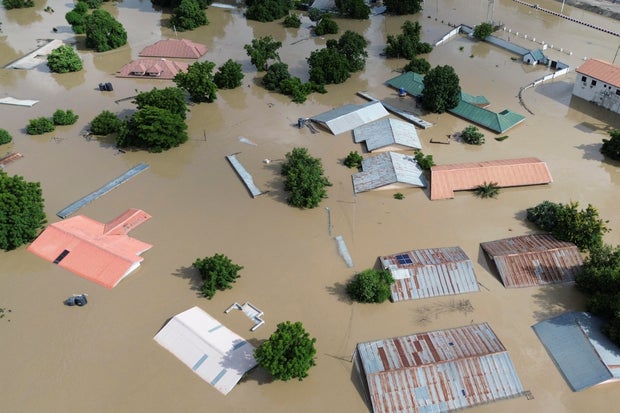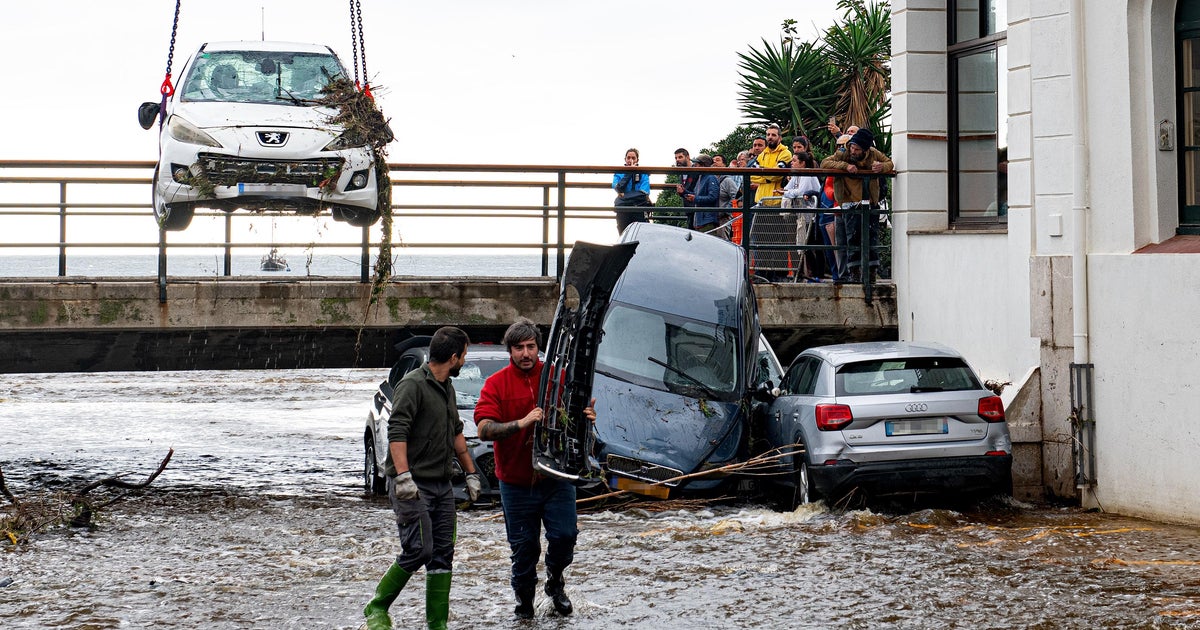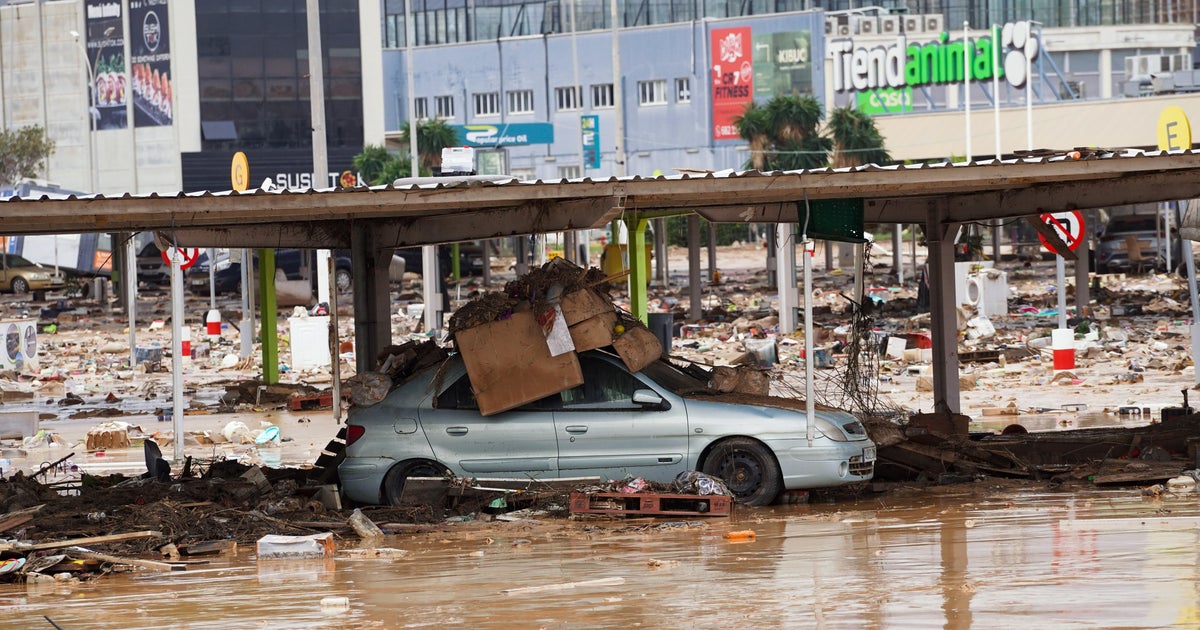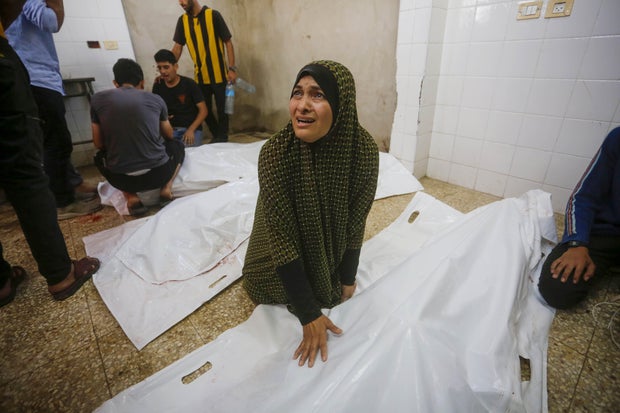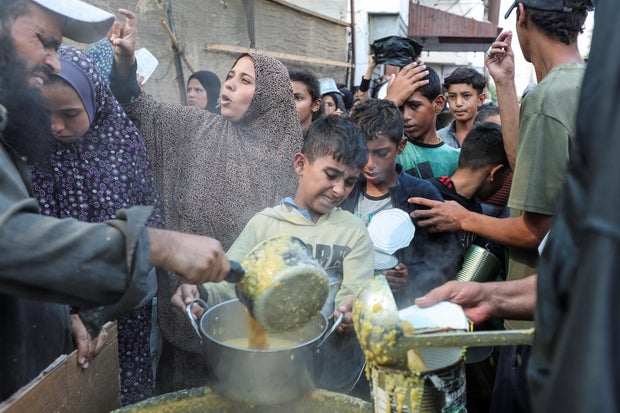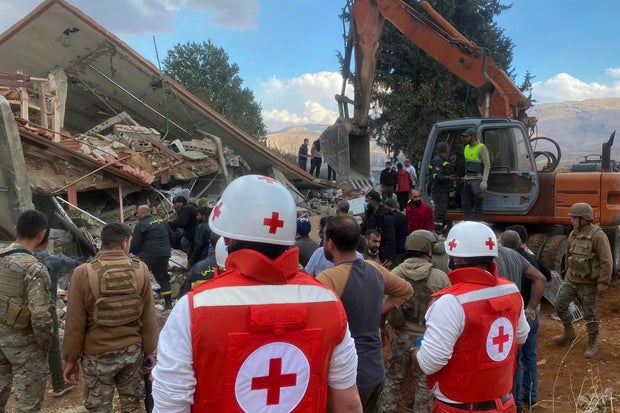CBS News
Deadly flooding in West and Central Africa leaves corpses of crocodiles and snakes floating among human bodies

Houses swept away to the very last brick. Inmates frantically fleeing the city’s main prison as its walls were washed away by water rising from an overflowing dam. Corpses of crocodiles and snakes floating among human bodies on what used to be main streets.
As torrential rains across Central and West Africa have unleashed the most catastrophic floods in decades, residents of Maiduguri, the capital of the fragile Nigerian state of Borno — which has been at the center of an Islamic extremists’ insurgency — said they have seen it all.
Earlier this week, Nigerian authorities said more than 270 inmates were missing after escaping from custody when severe flooding damaged a prison in Maiduguri, CBS News partner BBC reported. Borno state Governor Babagana Zulum described the extent of the damage in the area as “beyond human imagination.”
The floods, which have killed more than 1,000 people and displaced hundreds of thousands across the region this year, have worsened existing humanitarian crises in the countries which have been impacted the most: Chad, Nigeria, Mali and Niger. Over four million people have been affected by flooding so far this year in West Africa, a threefold increase from last year, according to the U.N.
With rescue operations still underway, it is impossible to give an accurate count of lives lost in the water. So far, at least 230 were reported dead in Nigeria, 265 in Niger, 487 in Chad and 55 in Mali, which has seen the most catastrophic flooding since the 1960s.
While Africa is responsible for a small fraction of global greenhouse gas emissions, it is among the regions most vulnerable to extreme weather events, the World Meteorological Organization said earlier this month. In sub-Saharan Africa, the cost of adapting to extreme weather events is estimated between $30-50 billion annually over the next decade, the report said. It warned that up to 118 million Africans could be impacted by extreme weather by 2030.
Maiduguri, the capital of Borno state, has been under significant strain. Over the last decade, Borno has been hit by a constant string of attacks from Boko Haram militants, who want to install an Islamic state in Nigeria and have killed more than 35,000 people in the last decade.
AUDU MARTE/AFP via Getty Images
Saleh Bukar, a 28-year-old from Maiduguri, said he was woken up last week around midnight by his neighbors.
“Water is flooding everywhere!” he recalled their frantic screams in a phone interview. “They were shouting: ‘Everybody come out, everybody come out!” Older people and people with disabilities did not know what was going on, he said, and some were left behind. Those who did not wake up on time drowned right away.
Local authorities are overwhelmed by the scale of the disaster: over 600,000 people in Borno state have been displaced, while at least 100 were killed and 58 injured, according to the U.N.
Last week, floods killed about 80% of the animals at the Borno State Museum Park and an unspecified number of reptiles escaped. Ali Donbest, who runs the Sanda Kyarimi Zoo, told the BBC that he does not know exactly how many wild animals escaped the zoo but a hunt was on to locate them. He also said the cages where the lions and hyenas were kept had been submerged by floodwaters but the zoo could not determine if they had escaped.
Maiduguri resident Ishaq Sani told the BBC his biggest fear is to come across a wild animal. He abandoned his home due to the floods and is now staying with a friend in another location.
The waters also knocked down the walls of the local police station and some of the government’s offices.
Rescue operations continue 10 days later, with some parts of the city returning to normal as waters recede.
Flooding forces woman to abandon her baby
Survivors recounted chilling scenes of bodies in the floodwaters.
Aishatu Ba’agana, a mother of three, had to abandon her recently born baby as water surging over her house overwhelmed her. “I yelled for my family to help me get my child, but I don’t know if they were able to. I haven’t seen any of them since,” she said, crying at the camp where rescue workers brought her.
The flood also destroyed crucial infrastructure, including two major dikes of a dam along Lake Alau. When the dam failed, 540 billion liters of water flooded the city. Key bridges connecting Maiduguri collapsed, turning the city into a temporary river.
Governor Babagana Zulum urgently appealed for international assistance. “Our resources are stretched to the limit, and we cannot do this alone,” he said.
The World Food Program has set up kitchens providing food to the displaced in Maiduguri as well as emergency food and cash assistance to people in the most hard-hit areas. USAID said Wednesday it has provided more than $3 million in humanitarian assistance to West and Central Africa, including $1 million provided in the immediate aftermath of the floods.
But many say they were left to fend for themselves.
Floods in mostly arid Niger have impacted over 841,000 people, killing hundreds and displacing more than 400,000.
Harira Adamou, a 50-year-old single mother of six, is one of them. She said the floods destroyed her mud hut in the northern city of Agadez.
“The rooms are destroyed; the walls fell down,” she said. “It’s a big risk to live in a mud hut but we don’t have the means to build concrete ones.”
Adamou, who is unemployed and lost her husband four years ago, said she has not received any support from the state and has not had the opportunity — or the means — to relocate. She and her children are living in a temporary shelter next to their shattered hut, and fret that the torrential rains might return.
“I understood there was a change in the weather,” she said. “I have never seen a big rain like this year here in Agadez.”
In Maiduguri, 15% of the city remains underwater, according to local authorities. As forecasts predicted more rains across the region, Nigerian authorities warned earlier this week that more floods are expected.
Bukar said he kept going back to see whether the water that swallowed his home had receded, but that has not happened. He said he has not received any aid from authorities except for some food items handed out at the local school, where he is sheltering with 5,000 others.
He is trying to stay sane by helping others. Along with his friend, he helped recover 10 bodies and rescued 25 people, rowing down the streets in a canoe. He said he’s also helping out cooking meals for those that are sheltering with him.
“I am volunteering to help, but I am also a victim,” he said. “Our people need us. They need help.”
The deadly flooding comes about five months after hundreds of people in Tanzania and Kenya died after heavy rain during the region’s monsoon season.
CBS News
A French village honors a U.S. soldier killed in WWII

Watch CBS News
Be the first to know
Get browser notifications for breaking news, live events, and exclusive reporting.
CBS News
Israel strikes killed dozens in Lebanon and northern Gaza, officials say

Israeli strikes killed dozens of people on Sunday in Lebanon and the northern Gaza Strip, where the military has been waging a major offensive for more than a month that aid groups say has further worsened the humanitarian crisis in the besieged enclave.
An Israeli airstrike killed at least 23 people in the village of Aalmat, north of Beirut and far from the areas in southern and eastern Lebanon where the militant Hezbollah group has a major presence. Lebanon’s Health Ministry said a further six people were wounded. There was no immediate Israeli comment.
In northern Gaza, an Israeli strike on a home sheltering displaced people in the urban refugee camp of Jabaliya killed at least 17 people, according to the director of a nearby hospital that received the bodies.
Ashraf Amra/Anadolu via Getty Images
Dr. Fadel Naim, director of the Al-Ahly Hospital in Gaza City, said the dead include nine women, and that the toll was likely to rise as rescue efforts continue.
The Israeli military said it targeted a site where militants were operating in Jabaliya, without providing evidence. It said the details of the strike are under review.
A separate strike on Sunday hit a house in Gaza City, killing Wael al-Khour, a minister in the Hamas-run government, as well as his wife and three children, according to the Civil Defense, a first responders organization that operates under the government.
Israeli forces have encircled and largely isolated Jabaliya and the nearby towns of Beit Lahiya and Beit Hanoun for the past month, allowing in only a trickle of humanitarian aid. Hundreds of people have been killed since the offensive began on Oct. 6, and tens of thousands of people have fled to nearby Gaza City.
On Friday, experts from a panel that monitors food security said famine is imminent in the north or may already be happening. The growing desperation comes as the deadline approaches for an ultimatum the Biden administration gave Israel to raise the level of humanitarian assistance allowed into Gaza or risk possible restrictions on U.S. military funding.
Ramadan Abed / REUTERS
The northern third of Gaza, including Gaza City, was the first target of Israel’s ground invasion and has suffered the heaviest destruction of the 13-month-old war, which was triggered by Hamas’ attack into southern Israel. As in other areas of Gaza, Israel has sent forces back in after repeated operations, saying Hamas has regrouped.
The military says it only targets militants, whom it accuses of hiding among civilians in homes and shelters. Israeli strikes often kill women and children.
On Sunday, the Israeli military released what it said was video footage of Hamas abusing detainees. The soundless footage, dated from 2018 to 2020, appears to show detainees with hoods over their heads chained up in stress positions. In some of the clips, men beat or poke them with batons.
It was not possible to independently verify the videos, which the military said it had recovered during operations in Gaza.
Rights groups have long accused the Hamas-run government in Gaza and the Western-backed Palestinian Authority in the occupied West Bank of abusing detainees and violently quashing dissent. Israel has been accused of similar abuses, especially since the start of the war. Israeli prison authorities say they follow relevant laws and investigate any allegations of wrongdoing.
Hezbollah began firing rockets, drones and missiles into Israel after war broke out in Gaza in solidarity with the Palestinians and its fellow Iran-backed militant group Hamas.
Israel retaliated, and a series of escalations over several months led to an all-out war in September, when Israel carried out a wave of heavy strikes and killed Hezbollah leader Hassan Nasrallah, as well as most of his top commanders.
SAM SKAINEH/AFP via Getty Images
Since then, Israel has struck areas deeper and deeper inside Lebanon, while Hezbollah has expanded its rocket fire from northern to central Israel. The fighting has killed over 3,000 people in Lebanon, according to the Health Ministry, and more than 70 people in Israel.
In videos purporting to show the aftermath of Sunday’s strike in Aalmat, some 40 kilometers (25 miles) north of Beirut, people were seen pulling the body of a little girl out of the rubble. The house had been flattened, and several cars nearby were also damaged.
The war in Gaza began when Hamas-led militants blew holes in the border fence and stormed into southern Israel on Oct. 7, 2023. They killed some 1,200 people, mostly civilians, and abducted around 250. Some 100 hostages are still inside Gaza, about a third of whom are believed to be dead.
Israel’s offensive has killed over 43,000 Palestinians, according to local health authorities who do not distinguish between civilians and militants in their count but say over half the fatalities were women and children.
Israeli bombardment and ground invasions have left vast areas of Gaza in ruins and displaced around 90% of the population of 2.3 million people, often multiple times. Hundreds of thousands of people are living in crowded tent camps with few if any public services and no idea of when they might return to their homes or rebuild.
Cease-fire talks mediated by the United States, Qatar and Egypt have repeatedly stalled since the start of the year, as have parallel efforts by the U.S. and others to halt the fighting between Israel and Hezbollah.
Qatar, which has served as a key mediator with Hamas, said over the weekend that it had suspended its efforts and would only resume them when “the parties show their willingness and seriousness to end the brutal war and the ongoing suffering of civilians.”
CBS News
Ted Danson on his new comedy series “A Man on the Inside”

Watch CBS News
Be the first to know
Get browser notifications for breaking news, live events, and exclusive reporting.


